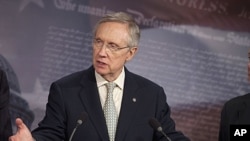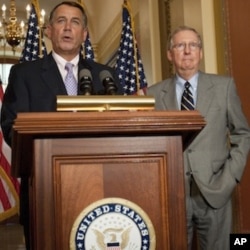U.S. Senate Majority Leader Harry Reid says Washington is no closer to a deal that would raise the country's borrowing limit and avoid a potentially catastrophic debt default.
Reid accused Republican leaders of refusing to negotiate in good faith.
He made his remarks on the Senate floor late Saturday, shortly after the top two Republicans in Congress, Senate Minority Leader Mitch McConnell and House Speaker John Boehner, voiced optimism the U.S. will reach agreement on the debt crisis.
In a press conference, Boehner urged President Barack Obama to come to an agreement with Republican leaders in Congress, saying if he does so, Democrats will follow. He said the president did not act on a plan that could have ended the impasse about a week ago.
Also Saturday, Reid and House Minority Leader Nancy Pelosi met at the White House with President Obama and Vice President Joe Biden. Mr. Obama spoke by phone with McConnell.
U.S. political leaders have until Tuesday to raise the country's $14.3 trillion debt ceiling, or risk triggering the first debt default in U.S. history. But they remain deadlocked on how best to raise the borrowing limit and cut government spending.
On Saturday, the Republican-led House of Representatives easily defeated a debt plan produced by Reid, just as the Senate Friday night rejected a plan put forth by Boehner and narrowly approved by the House.
Senator Reid is planning a test vote on his plan early Sunday. The measure, supported by the White House, would cut government spending by $2.5 trillion and raise the legal limit on borrowing enough to fund the government through the end of 2012.
Reid needs 60 votes in the 100-member Senate to end debate on his measure and move to a final vote on Monday. But 43 opposition Republicans said they would not vote for his measure, lending still more uncertainty to the political standoff.
Senate Democratic leaders are hoping to complete their action on a debt limit increase by early Monday, just before U.S. stock markets reopen for the week. The deadlocked Washington debt negotiations have roiled investors, with the key Dow Jones Industrial Average of stocks dropping more this past week than it has in any week in the last 14 months.
Republicans are calling for a short-term fix and new consideration of the debt ceiling in early 2012, while Democrats are pushing for a plan to cover the nation's borrowing needs through next year and past the presidential and congressional elections in November 2012.
Boehner's plan called for an immediate $900 billion increase of the U.S. debt ceiling in exchange for more than $900 billion in spending cuts over the next 10 years. It offers to raise the debt limit again early next year if Washington can work out more spending cuts and send to the country's 50 states a proposal for a constitutional amendment requiring the national government to balance its budget each year.
Mr. Obama said the Republican plan pushed by Boehner would hold the economy captive to Washington politics once again by forcing the nation to relive the debt crisis in just a few months.





